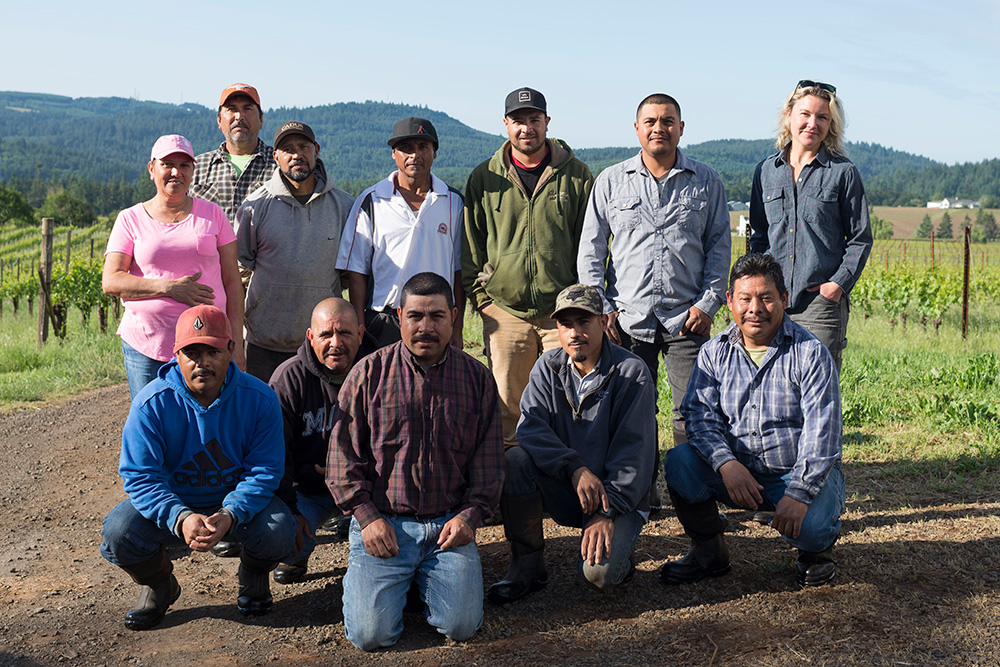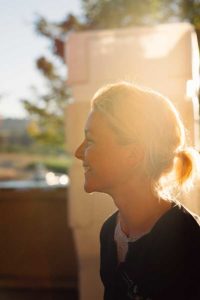The people of Hope Well are as strong and consistent as the land itself. I was so lucky as a child to grow up amongst people I now work beside, who care deeply about their work and know intimately the unique qualities of this place. The gift of steady and constant care over many years is invaluable. Our relationships, our relationships to this place we all love and work together, those are just some of the many benefits of committing to people and people committing to place. These are my people, my family, my friends, and they are the great heart that beats in Hope Well.
 front row, left to right: Juan, Javier, Francisco, Serafin (Tito), Vicente (Cente)
front row, left to right: Juan, Javier, Francisco, Serafin (Tito), Vicente (Cente)
back row, left to right: Blanca, Joaquin (Keno), Jose Luis (Fish), Jose Luis, Miguel, Ivan, Mimi
Mimi Casteel
 Mimi is the daughter of Ted Casteel and Pat Dudley, co-founders of Bethel Heights Vineyard. Growing up working in the vineyard and winery, Mimi gained such an appreciation for the industry that she promptly left home after high school. Armed with a BA in History and Classics from Tulane University, Mimi spent the next year working in various National Forests across the west. Her adventures fueled her passion for studying botany, forestry, and ecology. Mimi earned her MS from Oregon State University in Forest Science, and spent the next several years working as a botanist and ecologist for the Forest Service, living in the backcountry. She could never get past the longing for the vineyard, and working with the vines. Mimi returned to Bethel Heights in 2005, along with her cousin and childhood best friend Ben to take the helm as second generation winegrowers and owners.
Mimi is the daughter of Ted Casteel and Pat Dudley, co-founders of Bethel Heights Vineyard. Growing up working in the vineyard and winery, Mimi gained such an appreciation for the industry that she promptly left home after high school. Armed with a BA in History and Classics from Tulane University, Mimi spent the next year working in various National Forests across the west. Her adventures fueled her passion for studying botany, forestry, and ecology. Mimi earned her MS from Oregon State University in Forest Science, and spent the next several years working as a botanist and ecologist for the Forest Service, living in the backcountry. She could never get past the longing for the vineyard, and working with the vines. Mimi returned to Bethel Heights in 2005, along with her cousin and childhood best friend Ben to take the helm as second generation winegrowers and owners.
In 2015 Mimi left Bethel Heights and began her Hope Well journey, building an island of biodiversity and resilience on her own 80-acre farm, growing grapes for others to support the farm, and making wines to give a voice to the process of regeneration. Firmly convinced that moving from conventional to regenerative agriculture on working lands is the most powerful tool humanity has to reverse climate change, the mission of Hope Well has been to help spread the word by example, one farm at a time.
2020 changed everything. In 2020 the climate delivered a clear personal message that there is no time left for a one-farm-at-a-time strategy to address the climate crisis. In 2021 Mimi made the hard decision to move Hope Well, the wine, the sheep, the chickens, the children, the philosophy, the entire ethos, to a much smaller, integrated farm that allows for the time and personal capacity to do the work that needs to be done now, building strategies and networks that can transform agriculture on a global scale while there is still time.